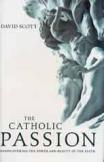Light on Mystery
This is a difficult book to classify. It is not history or theology or philosophy, nor is it poetry, exegesis, criticism or hagiography—although it includes something of each. Perhaps it might be considered a manual for converts, a handbook for participants in a parish adult initiation group. It is, as the subtitle indicates, a wholly positive appreciation of the power and beauty of Catholicism, indeed of the mystery that has drawn so many different and disparate characters to the Catholic fold both in the past and in the present. Thus the reader is presented with passages from both the Hebrew Bible and the New Testament, with an eclectic group of great teachers and great saints, as well as poets and martyrs, musicians and writers whose only common denominator is that they are Catholic.
As such, they embody James Joyce’s wonderful phrase, “Here comes everybody.” We meet Augustine, Origen, Tertullian, Eusebius, the two Gregorys, Thomas Aquinas, Charles de Foucauld, Dorothy Day, Paul Claudel, Charles Péguy, Francis Thompson, Olivier Messiaen, André Dubus, Catherine DeHueck and others.
But this is also the difficulty, or chief irritant, of the book. By sweeping together such a cross section of saints and sinners (e.g., Eugene O’Neill), the book lacks context, and strikes the reader as an almost ahistorical rendition of the life of Catholicism. Too much has happened in the history of the church, in the last several centuries especially, to characterize things Catholic in completely positive terms. To be sure, something common and important does hold Catholics together—one might call it a passion—but David Scott might have used more nuance in presenting what many see as both the complexity and ambiguity of the riches of the faith.
The author, who has also written a book about Mother Teresa, and who is clearly influenced by Pope John Paul II’s theology of the body, is at pains to describe the unity that is the beauty and power at the heart of Catholicism. My questions about the lack of historical context emerged as I read the chapters on Scripture as the word of God and the importance of the sacraments in Catholic life. Scott emphasizes the Jewishness of Jesus and the centrality of the Eucharist in Catholic experience. But he seems to ignore the significant advances that have been made in scriptural studies in the last several decades, the significance of ecumenical discussions on baptism and Eucharist that followed the Second Vatican Council and the many changes that derived from that historic meeting.
Further, Scott tends to overlook the pluralism represented in contemporary Catholic thought. From his brief overview of things Catholic, one would think that the 20th century’s ecumenical council never happened. Rather, the final lines of the book quote the Council of Trent (1556) to the effect that doctrine and teaching in the church spring from and derive from love. The Catholic passion is the passion of love.
It is important to analyze what is unique, what is special that holds together the wild assortment of characters who have named themselves Catholic in the past and continue to do so today. Unfortunately, however, without reference to the pluralism that already obtained in the medieval period and continues to grow, Scott has not fully explored that unifying dynamic.
This article also appeared in print, under the headline “Light on Mystery,” in the November 7, 2005, issue.








